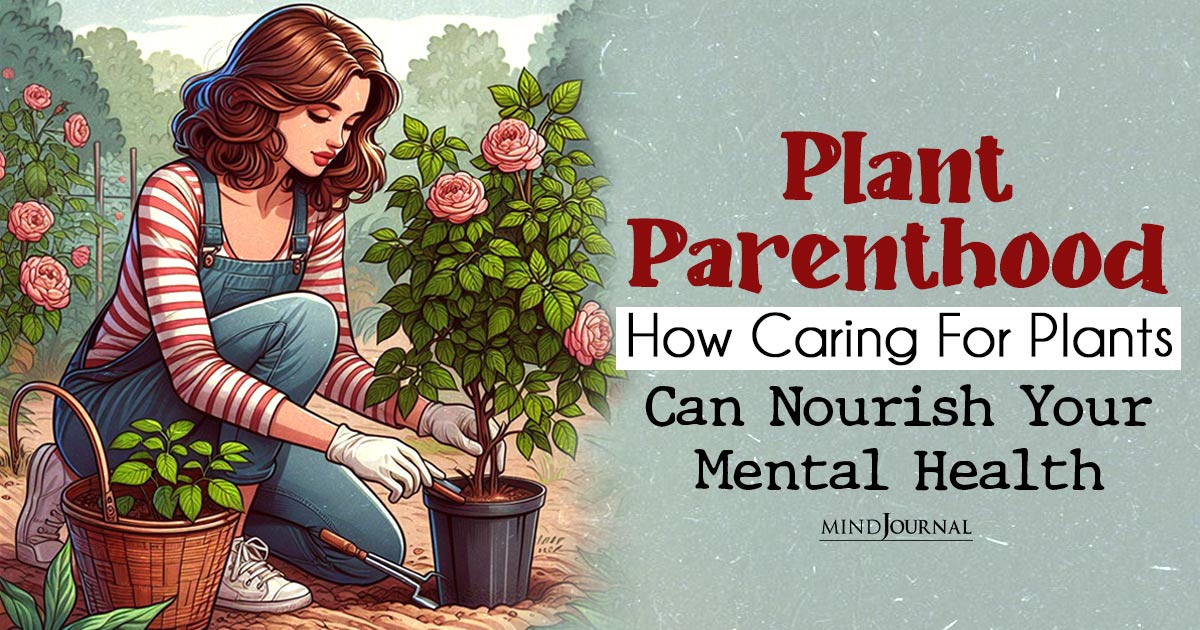Have you ever wondered why so many people are embracing plant parenthood? It seems like everywhere you turn, there’s someone proudly displaying their thriving indoor jungle or posting pictures of their leafy companions on social media.
But this trend is more than just a passing fad; it’s a movement that promotes not only the well-being of plants but also the mental health of humans.
Let us explore the concept of plant parenthood, why caring for plants is important for both plants and humans, and learn how do plants help mental health.
What is Plant Parenthood?
Plant parenthood is the act of nurturing and caring for houseplants as if they were our own children. It involves taking responsibility for their growth, providing the necessary conditions for their well-being, and tending to their needs.
Just as a parent takes care of their child’s physical and emotional well-being, plant parents strive to create an environment where their plants can thrive. Plant parenthood fosters a sense of responsibility, connection, and purpose, as individuals develop a nurturing relationship with their green companions.
Ultimately, plant parenthood is a journey of mutual growth and well-being for both plants and their caregivers.
Related: 5 Houseplants That Are Oxygen Bombs To Keep The Air Within Your House Clean
Why Caring for Plants is So Important
Caring for plants not only nurtures their growth but also benefits humans by purifying air, fostering connection with nature, and enhancing our overall well-being. Here’s why plant parenthood is important –
1. How It Helps Plants
Plants rely on human caretakers for their survival, especially when they are kept indoors. Regular watering, proper lighting, and appropriate fertilization ensure their growth and longevity.
By assuming the role of a plant parent, we create a symbiotic relationship where plants provide us with numerous benefits in return.
2. How It Helps Humans
Here’s are some of the factors that highlight how plant parenthood can help to make your life better –
A. Connection with Nature
In today’s fast-paced, technology-driven world, we often find ourselves detached from nature. Caring for plants allows us to reconnect with the natural world, creating a sense of harmony and tranquility.
The act of nurturing plants provides a tangible connection to the earth and reminds us of our place within it.
B. Improved Air Quality
Plants act as natural air purifiers, removing toxins from the air and releasing oxygen. By introducing plants into our living spaces, we can improve the quality of the air we breathe, leading to better respiratory health and increased cognitive function.
Related: Tree Energy: Discover The Natural Healing Power Of Trees!
How Do Plants Help Mental Health: 5 Factors To Consider
Ever wondered how plants contribute to mental well-being? Here are five key factors highlighting the positive impact of plants on our mental health –
1. Stress Relief
Numerous studies have shown that being in the presence of plants can reduce stress levels. The calming effect of greenery and the rhythmic nature of caring for plants have a soothing impact on our nervous system, promoting relaxation and reducing anxiety.
Plant parenthood requires focus and attention, diverting our minds from daily pressures and anxieties. The act of tending to plants can be meditative, allowing us to slow down, be present, and find solace in the simplicity of nature.
2. Mood Enhancement
Plants have the power to uplift our spirits and improve our mood. The vibrant colors and textures of leaves and flowers can evoke feelings of joy and happiness.
Additionally, the act of nurturing plants triggers the release of dopamine, a neurotransmitter associated with pleasure and reward, leading to an improved overall mood.
3. Increased Productivity
Having plants in our indoor spaces has been linked to increased productivity and concentration. Studies have shown that the presence of greenery can enhance cognitive function, improve memory retention, and boost creativity.
This is particularly beneficial for those working or studying from home, where a plant-filled environment can provide a refreshing change of scenery.
4. Emotional Support
Plants can serve as a source of emotional support, especially for those experiencing loneliness or isolation. The act of caring for plants provides a sense of companionship, alleviating feelings of emptiness.
Additionally, the non-judgmental nature of plants allows us to express our emotions freely, fostering emotional well-being.
5. Sense of Purpose
Taking care of plants gives us a sense of purpose and responsibility. As plant parents, we become aware of the impact our actions have on the well-being of another living being.
This responsibility fosters a sense of accomplishment and fulfillment, boosting our self-esteem and overall sense of well-being.
Related: 25+ Best Plants To Detox Your Home: Purifying Your Living Space With Nature’s Greenery
Takeaway
Plant parenthood is not just a trendy hobby; it is a practice that nourishes both plants and humans alike. By assuming the role of a plant parent, we cultivate a deeper connection with nature, reduce stress levels, find a sense of purpose, and enhance our overall well-being.
So, if you’re looking for a simple and accessible way to improve your mental health, consider embracing plant parenthood and let the magic of nature transform your life.
Happy planting!
Frequently Asked Questions (FAQs):
What does it mean to be a Plant Parent?
Being a plant parent entails nurturing houseplants, providing care, and fostering a sense of responsibility towards their well-being.
Why Millennials are suddenly so obsessed with houseplants?
Millennials embrace houseplants for their aesthetic appeal, stress-relieving benefits, and as a means of connecting with nature indoors.
Does Gen Z like plants?
Yes, Gen Z shows a growing interest in plants, drawn to their environmental benefits, aesthetic appeal, and therapeutic qualities in urban settings. Other reasons may include environmental consciousness, mental well-being, and decor trends.










Leave a Reply